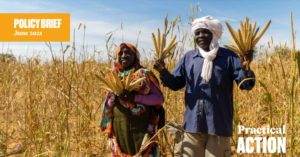More investment into community-led adaptation to climate change is needed urgently, according to a new paper published by Practical Action.
The Agricultural Adaptation to Climate Change brief has been launched to give policy makers and negotiators at climate talks working examples of where people in low and middle income countries are leading local adaptation to climate change.

The paper also highlights the need to for additional finance for adaptation and policies that can make it possible for locally-owned and locally led work to achieve impact at scale.
It was written by senior policy and practice advisor in agriculture at Practical Action, Chris Henderson. He said:
“This paper makes clear recommendations and backs them up by showcasing a number of live cases where community-led work is enabling people living on the front line of climate change to adapt to it.
“All of these examples could, and should, be taken to scale, but we need policies and finance that will end the lack of investment in grassroots work.
“Adaptation to climate change doesn’t always have to be complicated. But support is needed so that when people know the problems they face, and what they need to solve them there are mechanisms in place to enable them to take back control of their lives.”
The paper calls for five specific priorities to support adaptation:
1. Investing in learning from community-based adaptation to build consensus and understanding between communities and other development actors.
2. Focusing on women and other marginalized groups in agriculture and national climate policies and
plans, to ensure that women play a central role in learning and planning.
3. Paying attention to local and indigenous knowledge, which can improve the uptake and sustainability
of adaptation technologies.
4. Focus on the viability of community-based adaptation so that it is sustainable, is supported
by private sector actors, and goes to scale. This includes action by government to create incentives for
investment.
5. Promoting analysis of risk and planning that anticipates uncertainty caused by climate change so it is
better to prepare for risk.
To talk to Chris Henderson about any of the issues raised in the paper, please contact him via his LinkedIn profile or email [email protected]